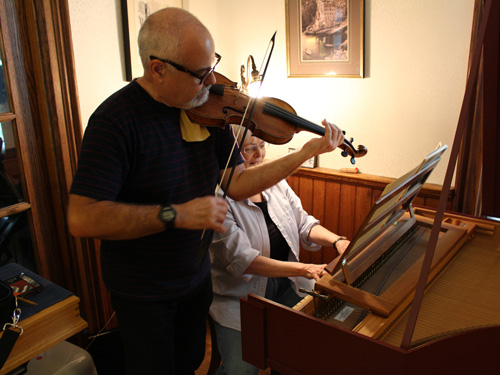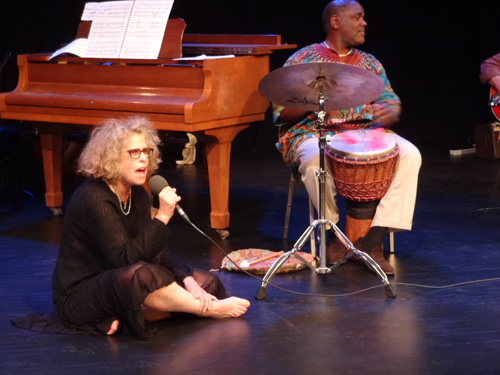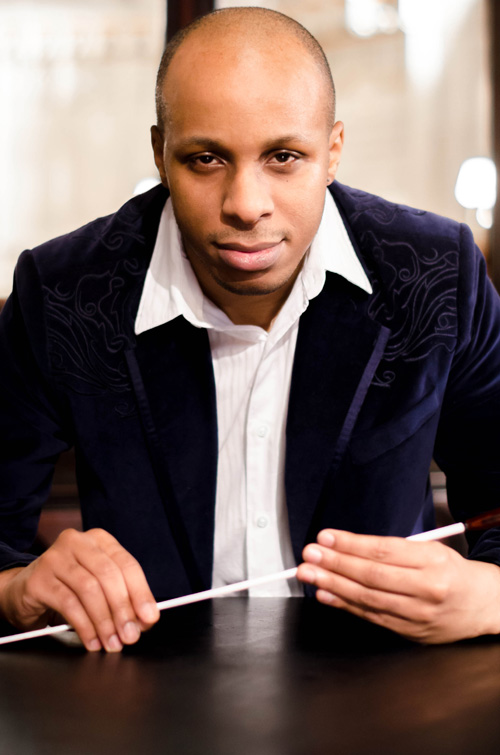Feature: Bennington Baroque

Published in Berkshires Week on August 20, 2014
Original article: http://www.berkshireeagle.com/berkshiresweek/ci_26371351/bennington-baroque-improvise-old-school
NORTH BENNINGTON — This Saturday evening, Bennington Baroque will take its audience back in time to an era of musical history that predates modern instruments, notation, tuning standards and playing techniques.
Using historically accurate period instruments and plenty of their own creativity, the quartet will awaken pieces of music written in the baroque era, which lasted from roughly 1600 to 1750, performing works by French composers François Couperin (1668-1733), Michel Pignolet de Monteclair (1667-1737) and Marin Marais (1656-1728), as well as and several pieces by Georg Philipp Telemann (1681-1767) of Germany.
While classical music enthusiasts will notice a variety of differences between baroque music and modern or mainstream classical music, harpsichordist Sandra Mangsen and baroque violinist Kevin Bushee explained that baroque music is unique in its definition of virtuosity and rooted in a specific period of human exploration.
“This music is really about trying to figure out what was done in the classical period, in Greece and Rome,” said Bushee. “In the 17th century, they had few examples of anything from antiquity, so a lot of it was built on bits and pieces of architecture, what they saw in Rome, and what they knew from theoretical writings. But they didn’t have the sound, so the 17th century really just dreamed it up.”
With the discovery of Pompeii and other archeological finds, Bushee said, the musicians of the 18th century had a much more advanced understanding of ancient Greek and Roman styles.
“There was almost a science surrounding antiquity at that point, and they could glean a lot more information. That’s why you then had Haydn and Mozart and so on,” he said.
From a musical perspective, Bushee and Mangsen said, rather than showing off impressive displays of technical skill, like some classical music, baroque composers were more interested in evoking an emotional response from their audience.
“With this music, it’s a different kind of virtuosity. It’s a virtuosity of feeling, not of technical brilliance,” said Bushee, quoting Dutch baroque musician Sigiswald Kuiken.
This alternative artistic focus makes playing baroque music a significantly different experience from performing other types of classical music, they said, as it asks the performers to inject their own personality into every piece.
“In the 17th and 18th centuries, composers were often players,” Bushee said, “so that notion of improvising is so much a part of this music making. We have the notes on the page, but then we realize that in this tradition, it was accepted and anticipated that the players would add to what’s on the printed page. We’re using our ears a lot — it’s a lot like jazz.”
“That’s what attracted me to this world,” Mangsen said. “I didn’t go into music in the first place because I didn’t see it as intellectually interesting. But then, when I met the early music world, it seemed as if there was more room for your brain. There wasn’t just this received tradition that your teacher was giving you, where there’s a right way and you must play in that way.”
Using period instruments is also an important part of performing baroque music because they function and sound different from their modern counterparts in significant ways.
“A baroque flute, such as the one [Bennington Baroque performer Mathieu Langlois] will be playing, is much softer than a modern metal flute, has a smaller range, and has some notes that are covered — have a more muffled rather than an open sound, all due to the nature of the instrument,” Mangsen said. “A modern flute fixes these problems by using a lot of keys to make sure all of the sounds can be produced relatively equally. Meanwhile, the baroque composer knew the sounds on the baroque flute — if he wants a ghostly sound, he can write in a key that uses a lot of those covered pitches. You lose all of that on a modern flute.”
Bennington Baroque will perform Saturday with Mangsen on harpsichord, Bushee on baroque violin, Langlois on baroque flute and Andre O’Neil on viola da gamba. The program is built around a quartet piece, written by Georg Philipp Telemann when he was in Paris, placed in the context of several other Telemann works and a selection of pieces by French baroque composers.
“The subtext of the program is ‘Gee whiz, Telemann knew what was going on in France!,'” said Mangsen, adding Telemann was also versed in Italian traditions, which will also factor into the performance.
“People talk about Bach as someone who integrated the Italian and French styles, but Telemann did that even more,” she said. “He’s the most unsung composer of the 18th century.”
“Well, perhaps there are others,” she added, “but he’s my current hero.”



Leave a Reply